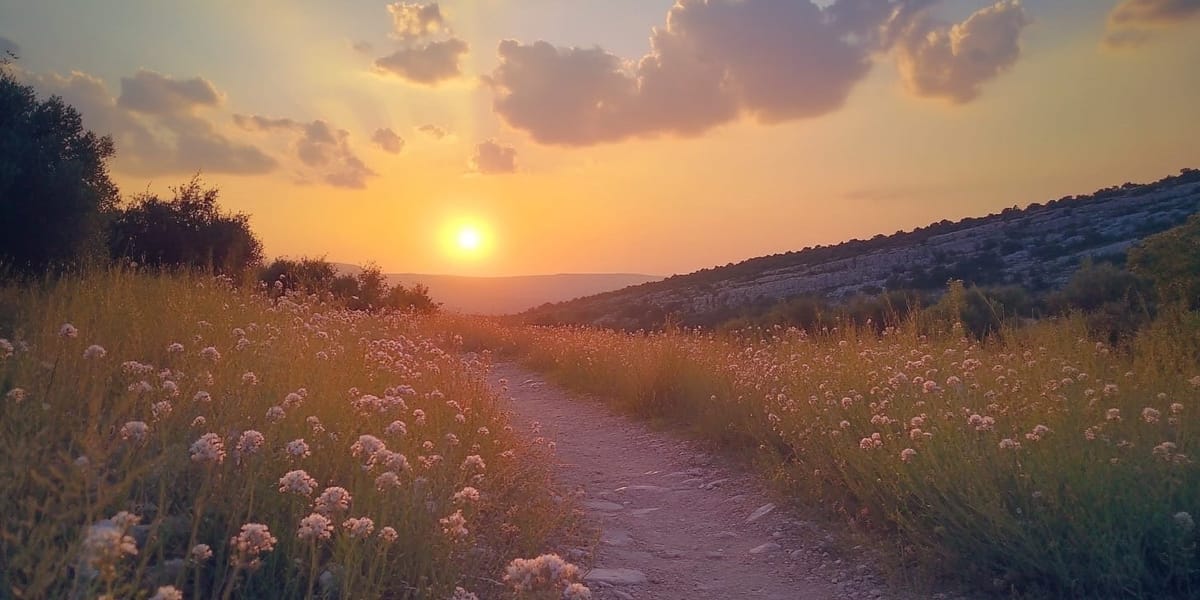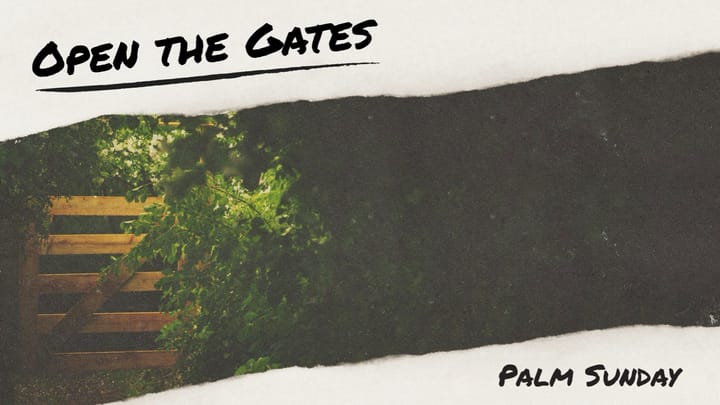Fairhaven Sermon 4-6-2025

Summary
In this week's service at Fairhaven United Methodist Church, Pastor Rev. Peg Bowman explored themes of hope, perseverance, and faith through a combination of music, scripture readings, and real-world examples. The congregation began with Pink’s song "Cover Me in Sunshine," which symbolizes the human desire for normalcy amidst life's challenges but ultimately encourages finding hope even when things seem bleak. Pastor Rev. Peg Bowman connected this sentiment to Psalm 126, a psalm sung by people of Israel as they climbed Mount Zion toward Jerusalem. The psalm highlights faith and perseverance through difficult times, suggesting that overcoming obstacles leads to joy and celebration in God's presence.
The sermon then turned to Paul’s letter to the Philippians (4:3-9), where Rev. Peg Bowman emphasized the importance of setting ambitious goals aligned with Jesus’ teachings—goals that require dedication, preparation, and commitment. She highlighted Senator Cory Booker's 24-hour filibuster as a metaphor for achieving such grand objectives through hard work and determination. Finally, in John’s Gospel (12:1-8), Pastor Rev. Peg Bowman discussed the significance of Mary anointing Jesus' feet with perfume—a gesture symbolizing preparation for his impending death—and contrasted it with Judas’ selfish concerns about money, emphasizing the importance of serving others and staying true to one's faith through challenging times. Overall, Pastor Rev. Peg Bowman encouraged congregation members to face life’s difficulties by setting clear goals inspired by Jesus' example and persevering with hope and devotion.
Transcript
Well, this is the fifth week of Lent, as mentioned before, a week when we start to head sort of deeper into this time of year. And yet, in the middle of the gathering darkness of Lent, our song for this week is called Cover Me in Sunshine. It's called Cover Me in Sunshine. The song in the video that we saw a moment ago featured the artist Pink and her real-life daughter in that video, who gets to sing those last few lines in the song, which I thought was kind of cool.
Cover Me in Sunshine is mostly, I think, a wish for just a plain, old, good, normal, everyday life. A day when the sun is shining and the weather is warm and life is good and nothing major is happening and there's a sense that everything is as it should be. Life isn't always like that, unfortunately. In fact, I don't know that life is even usually like that.
What we tend to think of as normal can be quite rare sometimes. And Pink seems to agree, I think, in her song. She's not actually singing about a day that is. She's singing about something she's been dreaming of, she says, or that she imagines.
And she talks about some day that's not quite here yet. So for now, get me through another day, she sings. So I think what she's really talking about is hope. And wherever she is at that particular moment, the sunshine that she's thinking about, she knows what it feels like, she can imagine it, and she describes it well, and she says, Tell me that the world's been spinning since the beginning, which, of course, it has.
And the beginning was a long time ago. I mean, thousands and thousands of years of human history. So many generations of people on this planet during those thousands of years. And each one of us has known sunshine and good times at least sometime in our lives.
I don't know about you, I find that song encouraging. It kind of lifts the spirits. But even if we're feeling down, which some of us have been, it cheers us up to hear a song about life and sunshine and good things. And if life is going well and everything is fine, it's still good to hear.
It's good to celebrate. So all that said, I think I detect just a little tiny, tiny bit of escapism in the song. She sings, I've been missing yesterday, but what if there's a better place? Which she's looking into the past, she's looking into the future, neither of which exist right now. And she sings, From a distance, all the mountains are just some tiny hills, which is true.
But if the mountains are things that we need to overcome, if the mountains represent, for example, life's struggles, then going in the other direction doesn't really solve the problems. So with all of these thoughts in mind, let's turn to our scriptures for today. Starting with Psalm 126, which we read a few moments ago, echoes, this thought, a psalm echoes many of the emotions in the song. Psalm 126 is also a song.
It was written to be sung. It was a song of the people of Israel that they would sing when they were climbing up a mountain. usually the mountain to Jerusalem. So both songs talk about dealing with mountains.
The singer puts distance between herself and the mountain. The psalmist has decided to climb the mountain. And I think the second choice is wiser, because if we avoid the mountain, it still stays there. It doesn't go away.
We can ignore it, but we can pretend it's not there. But the reality is it's still there. But if we climb the mountain..
. Once we get to the top, then the mountain has been conquered, and the goal that we were aiming for is waiting for us at the top. The writer of the Psalms sings, When the Lord restored the fortunes of Zion, we were like those who dream. The people of Israel probably spent a day or two climbing that mountain.
The path was well marked, it was well traveled, but the land is rocky and dry and not very welcoming, not a comfortable place to be in. But as the people reach the top, they can look out across the land of Israel and see its beauty at their feet. And the people have been praying and singing as they, on their way up the mountain, saying, may those who sow in tears reap in joy. And now at the top they are saying, our mouths are filled with laughter and our tongues with shouts of joy.
What they have hoped for has become a reality. They stand now in the courts of the Lord because at the top of this particular mountain is where the temple was, the Holy of Holies, and the people were there to meet God. And God does great things for God's people, God's house. Now back in those days, back when the psalm was written, God's house was actually a huge tent at that point.
They hadn't built the temple quite yet. And it was a place of making offerings and sacrifices. And of course, sacrifices were animals. And after the animals were sacrificed, they were cooked and shared with the extended family and the priests in the presence of God.
So it's like having a huge banquet at God's house. It was a time when God and God's people celebrated together, experiencing firsthand God's provision and God's love. When the psalmist says the Lord restored our fortunes, it's not clear whether he was talking about as a nation or as individuals, probably both. But, The Lord has done great things for us, the psalmist says, and this was the testimony of the people.
It's something that was seen by all the nations around them because these big parties they had at the top of the mountain, they could hear that from other places. And so the other nations were watching. They knew that God's people were meeting with God. Even though God's people weren't perfect, God made a way for them to be forgiven and restored.
And the nations witnessed God's justice and forgiveness and mercy. And that's exactly how God designed it to be. So as we turn then from there to Paul's letter to the Philippians, Paul is also climbing his own mountain, metaphorically speaking. Paul has set a goal for his life.
that is every bit as ambitious as climbing an actual mountain. Paul wants to be present and alive at the resurrection of the dead. A very ambitious goal. I mean, think about that.
How does a person make it to the resurrection? I mean, once we're dead, we're dead, right? How can we possibly have anything to say about what happens after we die? But Paul has discovered the answer to that question by trusting Jesus. We come to the resurrection of the dead in and through Jesus Christ, and Paul puts aside everything else in order to reach that one goal. Paul wants to be covered in the sunshine of God's love, not just for the good times but for forever. Paul's aiming high.
And it reminded me this past week, speaking of ambitious goals, this past week we witnessed an ambitious goal becoming reality. Y'all check out Senator Cory Booker. He sent himself a goal to break the record for the length of a filibuster in the Senate, and the record had been set back in the 1950s by Strom Thurmond, who spoke nonstop for 24 hours and 18 minutes. And Senator Booker decided he was going to break that record or give it his very best shot.
And like Paul, it's a very ambitious goal. Not something a person just get up one day and does. It's something you have to plan for, prepare for. He fasted.
He had his staff prepare a pile of letters and phone calls that he could read from people he represents. He limited his water intake because there's a rule in the Senate: if you filibuster, you can't stop speaking for any reason except to let other people ask you questions. You can't even step out to go to the bathroom. So he prepared himself physically and mentally, like the athlete that he once was, for over a week to prepare for this one day.
And the very last thing he did to prepare was he wrote on a three-by-five card and put in his pocket a book. The following, Isaiah 40, verse 31, But they that wait upon the Lord shall renew their strength. They shall mount up with wings as eagles. They shall run and not be weary.
They shall walk and not faint. Now that just happens to be my old pastor's favorite verse in the Bible. And it was also the favorite verse of Olympic runner Eric Little, the man about whom the movie Chariots of Fire was written. And he said, The point is, with all this, when we set an ambitious goal, if we really mean it, if we really want to attain that goal, preparation is a necessity and commitment is essential.
Succeeding at an ambitious goal is hard work and requires focus. Even Shakespeare once said, The readiness is all. It's in the preparation. The apostle Paul knew this.
He had watched Olympic runners back in his day. He had watched athletes train. And Paul knew if he wanted to reach this goal of standing alive in God's presence at the resurrection, that he had work to do. He also knew what wouldn't get him there.
And he lists these things in the passage that we just heard read, things that a lot of people back then believed in and counted on in order to get into heaven. Things like being born Jewish, being circumcised, keeping the law of Moses perfectly, being clergy. Paul was an ordained Pharisee. Paul had done all of these things, but he knew that his earthly righteousness counted for nothing.
The only thing that counted is Jesus. Amen. Jesus is the one who fulfilled the law. Jesus is the source of hope and love.
And Jesus is the only one who's ever walked out of the grave alive. Paul says, I have not made this my own, but Jesus has made me his own. In other words, it's not what you know or who you know. It's who knows you.
It's who knows you. So Paul aims his life and everything in it in the direction of Jesus. This choice that Paul made requires discipline and preparation and ongoing effort, just like what Senator Booker did, only a larger scale. All of us likewise need to be ready for an ongoing effort.
The song says the world's been spinning since the beginning and everything will be all right. And yes it has, and yes it will. For anyone who makes the same commitment that Paul has made and the same commitment the psalmist has made. We can't make the mountains of life look small just by walking away from them.
We can't wish them away. There's no other way to conquer a mountain than to climb it. We learn from the experiences of the psalmist and from the Apostle Paul that it is possible that the mountain can be conquered. And so with this in mind, last but not least, we turn to the Gospel of John.
In this story, this familiar story, Jesus is already pretty close to the top of a mountain, actually, because that's where Mary and Martha and Lazarus live. They live up close to the top of the Mount of Olives. And he's at their house having dinner with the disciples. It's about a week before Jesus' death.
And he's at their house having dinner with the disciples. And while everyone's reclining at table, Mary takes a bottle of expensive perfume, breaks it open, pours it on Jesus' feet, and wipes his feet with her hair. It's an act of deepest love. And the perfume itself was worth about a year's wages, they say.
Jesus explains that what she has done is to prepare him for burial. If this is true, which I trust what Jesus says, if Mary indeed knows that Jesus is about to die, then she's the only disciple who knows this. Jesus has been teaching his disciples for weeks now. We've been reading up to this point that he's been saying to the disciples, I'm going to Jerusalem.
I'm going to be dying there. But for some reason, the disciples aren't getting it. But Mary got it. And not only got it, but she didn't argue with Jesus, she didn't question, she didn't try to talk Jesus out of it.
Somehow she understood that dying was part of Jesus' mission. And much as it broke her heart, much as she loved him, she trusted him. And if the Lord says it's so, then it is so. Mary was ready to climb that mountain with Jesus, and so she did what she was able to do, and that is to prepare him for burial.
Judas, on the other hand, wanted to keep on dancing in the sunshine without having climbed the mountain first. Judas had developed the bad habit of helping himself to the disciples' money box. And that's his real objection to the use of Mary's perfume. He was expecting to get a cut of that and just wasn't got to get it.
He had plans for that money already that were not going to happen. So Judas scolds her, You should have sold that and given the money to the poor. Judas doesn't care about the poor. Poor people are people for whom every day takes the effort of climbing a mountain just to put food on the table, just to stay alive.
And Judas doesn't know anything about that. Jesus answers Judas saying, The poor you will always have with you, which is a quote that has been horribly misinterpreted down through the centuries. People have said, Well, that Jesus says giving to the poor is not all that important. Not so.
Let me set the record straight on this one by putting the quotation in its proper context. Jesus was quoting from the book of Deuteronomy, and the whole passage he's referring to reads as follows. This is God speaking. Okay.
If there's anyone among you in need, a member of your community in any of your towns, within the land that the Lord your God is giving you, do not be hard-hearted or tight-fisted toward your needy neighbor. You should rather open your hand, willingly lending enough to meet the need, whatever it may be, Give liberally and be ungrudging when you do so, for on this account the Lord your God will bless you in all your work and in all that you undertake. And here's the quotation. Since there will never cease to be some in need on the earth, therefore I command you, open your hand to the poor and the needy neighbor in your land.
So that last verse is what Jesus was quoting, and that's the context. Basically tells us that where it comes to the poor, not one of us is ever off the hook. Part of the reason why we're here on earth is to help each other climb the mountains of life. And sometimes we give the help, and sometimes we need to accept the help of others getting up that mountain.
And Judas was way out of line because he'd already missed so many opportunities to help the poor, and now he uses the poor as an excuse to gather money and take it for himself. How many charlatans have we seen doing the same thing throughout history, even in our own lifetimes? Seen over and over fancy cars and fancy clothes and air-conditioned dog houses taken from people's donations. But getting back to the mountain, For those of us who decide to climb the mountains of life, to pay the price of obeying God and following Jesus, we climb to find eternity. We climb to discover everlasting life.
The psalmist says, We were like those who dream. And he says, Those who go out weeping, bearing the seed for sowing, shall come home with shouts of joy. And Paul says, I want to know Christ and the power of his resurrection, because Christ Jesus has made me his own. And the dinner where Mary used her perfume was hosted by Lazarus, a man who Jesus had raised from the dead.
Jesus has within him the power of resurrection. So in all three of these scriptures, we see joy beyond imagining. We see faith that took the people there, faith that takes us there up the mountains of life into eternal life with Jesus. We see faith that took the people there, And so I invite all of us to keep these people in mind as we draw closer to the cross.
The writer of Hebrews says, Jesus, who for the joy that was set before him, endured the cross. And this very same Jesus is leading us up the mountain to the place in the throne room of God where we will live and where the sunlight will never fade. Amen.


